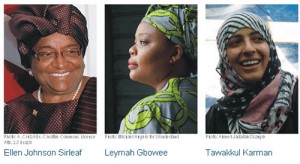Honoring the 2011 Nobel Peace Prize Laureates
Posted on: April 27, 2012, by : Editor We wish to congratulate the new winners of the Nobel Peace Prize—Tawakkul Karman of Yemen, and Leymah Gbowee and Ellen Johnson-Sirleaf of Liberia. Mabrouk, sisters. Your leadership by fearless example, your strength and moral dignity, the power of your convictions, and your daily acts of courage brought your nations to their feet in defiance of tyranny, violence, and war.
We wish to congratulate the new winners of the Nobel Peace Prize—Tawakkul Karman of Yemen, and Leymah Gbowee and Ellen Johnson-Sirleaf of Liberia. Mabrouk, sisters. Your leadership by fearless example, your strength and moral dignity, the power of your convictions, and your daily acts of courage brought your nations to their feet in defiance of tyranny, violence, and war.
This Nobel Peace Prize is a reminder that the UN Security Council Resolution 1325 issued in October 2000 is mandatory, and it calls on all States to increase the number of women in decision-making roles related to peace and conflict resolution.
The 2011 laureates play roles ranging from organizing the demonstrations to monitoring the peace talks, from participating in transitional government to being elected to the highest political office—this is exactly what Resolution 1325 looks like in action.
These three Nobel Prize winners demonstrate what happens when women support each other, and the ways in which women are already deeply invested, committed, experienced, and indivisible from each peace movement around the world—in particular, across the Arab world right now.
About the honorees:
Tawakkul Karman: Long before the Arab Spring began, the 32 year-old journalist and activist created Women Journalists Without Chains and lobbied for press freedoms in Yemen. In late January, Karman was seized in the middle of the night by plain-clothed police officers on the charges of organizing an unlicensed demonstration (after organizing the first student demonstrations asking President Saleh to step down), after receiving a death threat from President Saleh himself. Now free, many regard Karman a hero, stating that she’s had the courage to do what no man in the country can.
Leymah Gbowee: Trauma counselor Leymah Gbowee organized the Christian and Muslim women of Monrovia into the Women of Liberia Mass Action for Peace in 2002. Dressed in white to symbolize peace, and numbering in the thousands, the movement started with local women praying and singing each day in a public fish market. Soon it became a political force against violence and against their government. Under Leymah Gbowee’s leadership, the women compelled a meeting with President Charles Taylor. Their long sit-in outside the Presidential Palace in Accra helped force a final peace agreement to be reached, leading to the eventual election of Africa’s first modern-day female head-of-state.
Ellen Johnson-Sirleaf: As a member of the opposition in Liberia, Ellen Johnson-Sirleaf stood for national elections starting in 1985 and endured arrest and imprisonment for her political activities several times. After the war’s end, Johnson-Sirleaf served as the transitional government’s chair of the Governance Reform Commission. After becoming the first woman president of an African nation as newly elected President of Liberia in 2005, she established a Truth and Reconciliation Commission in 2006 and by Executive Order made elementary education free and compulsory in 2007.
